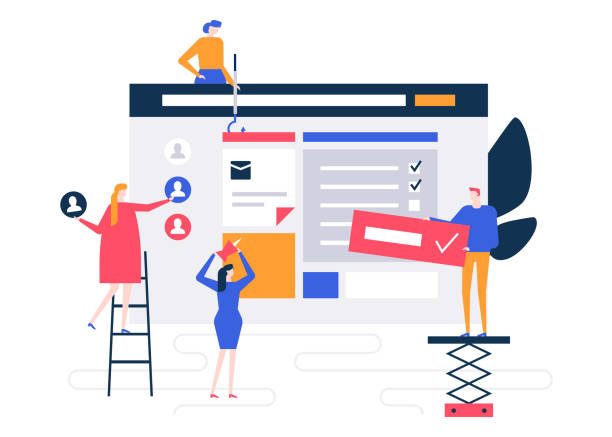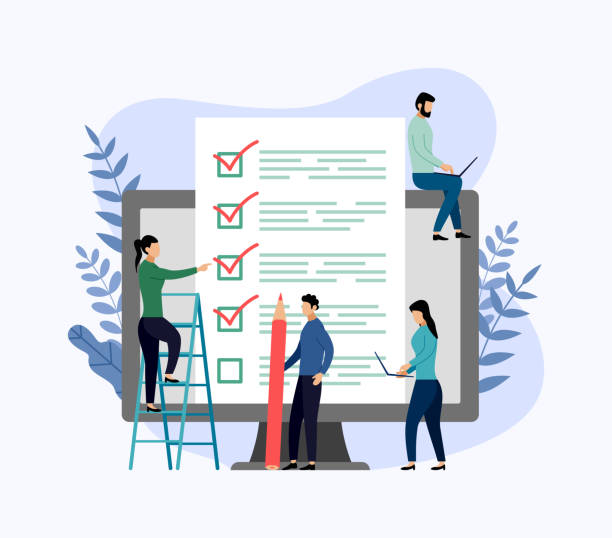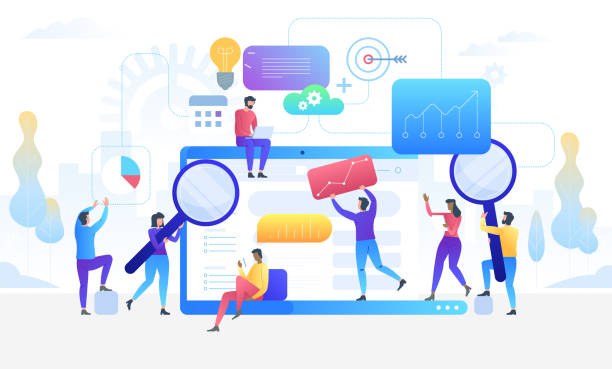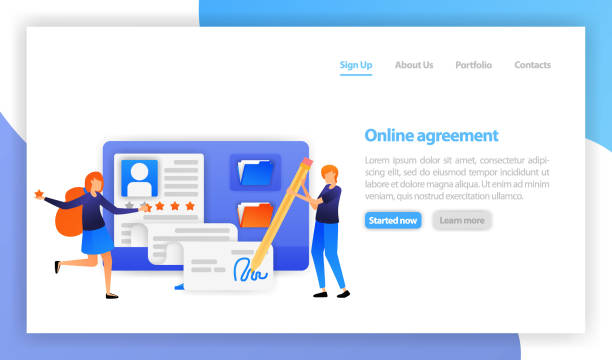Introduction to the Importance of Professional Website Design
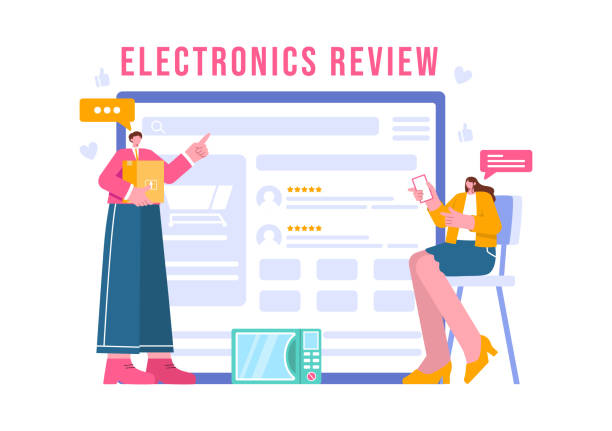
In today’s digital world, having a powerful online presence is not an option, but a necessity.
The core of this presence is a website with professional website design and user-friendliness.
Your website is the first point of contact for many potential customers with your brand, products, or services.
Therefore, professional website design goes beyond visual aesthetics; it means creating a seamless user experience that attracts visitors and converts them into customers.
A #professional_website demonstrates your credibility and expertise and builds audience trust.
If your website is old, slow, or inaccessible, you will not only lose visitors but also miss out on significant business opportunities.
The importance of #responsive_website_design, which displays correctly on various devices, has become more prominent than ever today.
This is a strategic investment for the future of your business and should not be underestimated.
Your website is your digital identity and should be designed to tell your story in the best possible way and leave a lasting impression on your audience.
A suitable website provides a clear path for communication with customers, providing information, and conducting transactions.
Without professional and efficient website design, you will fall behind in the online competition.
The main goal is to attract traffic, increase conversion rates, and ultimately, grow the business.
Do you know that the first impression customers have of your company is your website? With a powerful corporate site from Rasawb, multiply your business’s credibility!
✅ Custom and eye-catching design tailored to your brand
✅ Improved user experience and increased customer acquisition
⚡ Get a free consultation!
Initial Steps in Professional Website Design

Before starting any coding or graphic design, it is necessary to meticulously complete the initial and fundamental stages of professional website design.
The first step is to define the website’s goals: Is your goal to sell products, provide information, generate leads, or build a portfolio? The answer to this question determines the design path.
The next step is to accurately identify the target audience.
Who will visit your website? What are their interests, needs, problems, and online behaviors? This information helps you design the content and structure of the website in a way that is attractive and useful to them.
After that, it’s time to plan the website structure (sitemap) and user flow.
This educational and crucial stage ensures that all pages are correctly linked and that there is a logical path for the user.
Initial design of wireframes and mockups is also very helpful at this stage.
A wireframe is a simple layout of page arrangements, while mockups show more visual details.
These initial designs allow you to get feedback and make necessary changes before investing significant time and money in final implementation.
Choosing the right domain name and hosting is also a key decision at this stage.
The domain name should be memorable and relevant to your business, and the hosting should provide sufficient stability and speed for your professional website design.
Without this precise planning, the specialized website development project may encounter unexpected challenges, wasting your time and budget.
This phase is the foundation of any successful professional website design project.
Choosing the Right Platform and Content Management System
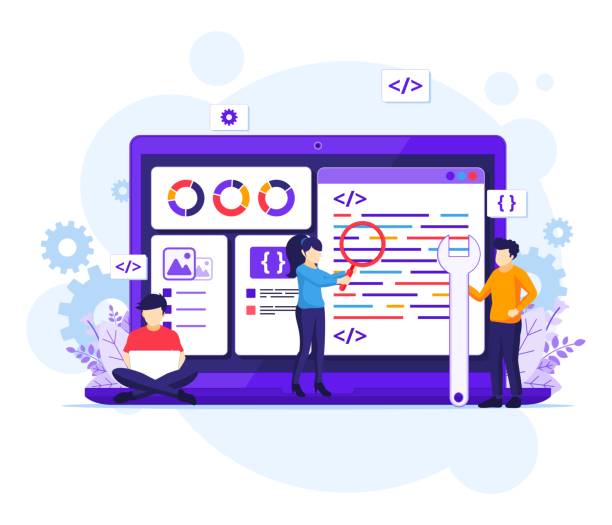
Choosing a platform and Content Management System (CMS) is one of the most specialized and vital decisions in professional website design.
This choice will directly impact the scalability, ease of management, security, and performance of your website.
There are numerous options, each with its own advantages and disadvantages.
WordPress, as the most popular CMS globally, is the first choice for many businesses and developers due to its ease of use, high flexibility, and vast ecosystem of plugins and themes.
It is ideal for small to medium-sized websites, small online stores, and blogs.
Joomla and Drupal are also powerful CMSs used for larger and more complex projects with specific security and customization needs.
Drupal is particularly suitable for enterprise and government websites that require high security and complex data structures.
Website builders like Wix or Squarespace are also suitable for beginners looking for a quick and easy solution, but they have limitations in customization and scalability.
Finally, developing a website from scratch with coding (such as using web development frameworks) is recommended for very specific and large projects that require complete control over performance and features.
The table below provides a descriptive comparison of common platforms to help you make a better choice for advanced website building.
Each platform has its advantages, and the right choice depends on the specific needs of your professional website design project.
| Feature | WordPress | Joomla | Drupal | Wix |
|---|---|---|---|---|
| Ease of Use | High (for beginners and professionals) | Medium (requires some learning) | Low (for developers) | Very High (drag and drop) |
| Flexibility and Scalability | High (with plugins) | Medium to High | Very High (for complex projects) | Low to Medium |
| Security | Medium to High (with plugins and maintenance) | High | Very High | High (by the platform) |
| Cost | Medium (hosting, theme, plugins) | Medium (hosting, theme, plugins) | High (specialized development and maintenance) | Medium (subscription plans) |
Principles of User Experience (UX) and User Interface (UI) in Professional Website Design
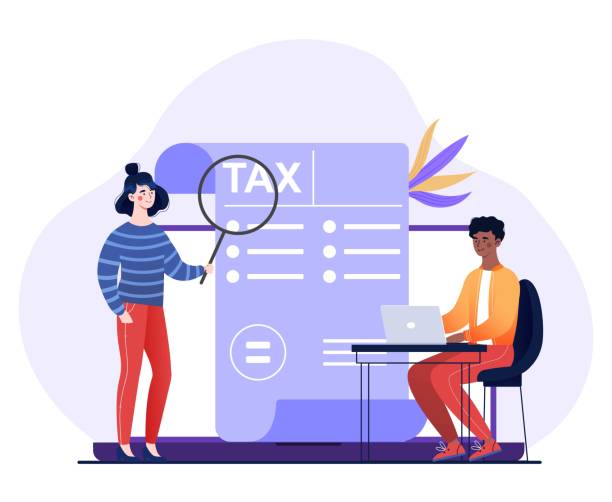
User Experience (UX) and User Interface (UI) are two main pillars in professional website design that are often confused but play different roles.
UI deals with the look and feel of the website (buttons, fonts, colors, images), while UX focuses on the user’s feelings and experience during interaction with the website; Is the website usable, useful, and enjoyable? A professional website design must have both beautiful UI and provide flawless UX.
Key UX principles include simplicity and intuitive navigation.
Users should easily find what they are looking for without getting confused or redirected to another page.
Website loading speed is also a critical factor in UX; slow websites can quickly frustrate users and cause them to leave the site.
Responsive Design, which correctly displays your website on any device from desktop to mobile, is also a fundamental principle.
In the UI section, using a brand-consistent color palette, readable fonts, and proper visual hierarchy to guide the user’s eye to important information, is of high importance.
Thought-provoking content in this area can help you: Do your users feel satisfied and efficient after visiting your website, or confused and frustrated? Is your design attractive enough to keep them longer? A professional website design is not limited to aesthetics but must solve user problems and provide a pleasant experience.
This important lesson is for anyone planning to build an advanced website.
Does your current corporate website not reflect your brand’s credibility and power as it should? Rasawb solves this challenge for you with professional corporate website design.
✅ Increased credibility and visitor trust
✅ Targeted customer acquisition
⚡ Click to receive a free consultation!
SEO and Search Engine Optimization

After completing your professional website design, it’s time for it to be seen.
Search Engine Optimization (SEO) is a specialized process that helps your website rank higher in Google and other search engine results and attract more organic traffic.
SEO consists of two main parts: On-Page SEO and Off-Page SEO.
On-Page SEO includes optimizing internal elements of your website such as Title Tags, Meta Descriptions, proper use of keywords, URL structure, image optimization, and page loading speed.
Ensuring that your content is filled with relevant keywords, but not excessively (known as Keyword Stuffing), is very important.
High-quality and unique content, answering user questions, and providing useful information play a significant role in On-Page SEO.
Off-Page SEO includes activities outside your website that help increase its credibility and authority, such as Link Building from other reputable websites.
The more reputable websites link to you, the more credible search engines will consider your website.
Competitor and keyword analysis is an inseparable part of SEO strategy.
With tools like Google Keyword Planner or Ahrefs, you can find high-volume and low-competition keywords.
Ultimately, SEO is an ongoing process and should be regularly monitored and updated even after professional website design to keep your website at the top of search results.
Google’s algorithms are constantly changing, and to succeed in SEO, you must keep up with them.
Content is King: Effective Content Strategy

The phrase “Content is King” perfectly expresses the importance of content in the success of professional website design.
Regardless of how beautiful and technically flawless your website is, without valuable content, it cannot attract and retain an audience.
An effective content strategy should define goals, audience, and content type before starting content production.
Content types can include blog articles, service or product pages, videos, infographics, and even interactive content.
For educating users, you can use explanatory articles or guides.
For more engagement, entertaining or thought-provoking content that makes users think is very effective.
Your content should be original, relevant, and up-to-date.
Avoid plagiarism and always strive to provide unique value to your audience.
Content structuring is also highly important; using titles and subtitles (H1, H2, H3), short paragraphs, lists, and relevant images helps with readability and better understanding of the content.
Additionally, a content calendar helps you plan regular content publication and ensure its consistency.
The ultimate goal is not just to provide information, but to build trust and credibility with the audience.
Quality content also helps your website’s SEO, as search engines reward rich and valuable content.
Your professional website design should be able to display this content in the best possible way.
Website Security and Maintenance After Launch

After your professional website design is complete and you launch it, your work is by no means finished.
In fact, this is where the specialized phase of maintenance and security begins.
Website security is a critical issue; hacked websites can damage your brand’s reputation, compromise user data, and even lead to legal penalties.
Installing an SSL certificate (HTTPS) is the first step to encrypting communications and increasing user trust.
Regular updates of the Content Management System (CMS), plugins, and themes are among the most important preventive measures.
Many cyberattacks occur through vulnerabilities in outdated software.
Using strong and unique passwords, as well as implementing Web Application Firewalls (WAF) and intrusion detection systems, can help protect your website.
Regular and automatic backups of website data and databases ensure a quick return to normal in case of any problem or attack.
Monitoring website performance, including loading speed and uptime, is also essential.
This news section can alert you that your website needs immediate attention.
Additionally, periodic security and penetration tests are recommended to identify weaknesses before they are discovered by attackers.
Professional website design also includes these important security and maintenance aspects after launch to ensure the stability and security of your online business.
| Maintenance and Security Action | Description | Recommended Frequency |
|---|---|---|
| Update CMS, Theme, and Plugins | Install the latest security and performance versions. | Monthly/Quarterly or immediately after update release |
| Website Backup | Regularly save files and database in a secure location. | Daily/Weekly (depending on change volume) |
| Performance Monitoring (Uptime, Speed) | Use tools to check availability and loading speed. | Continuous (with monitoring tools) |
| Check for Broken Links | Find and fix links pointing to non-existent pages. | Monthly/Quarterly |
| Security Scan and Malware Removal | Scan website to identify and remove malware. | Weekly/Monthly |
Website Analysis and Performance Improvement Tools

After launching your professional website design, it is crucial to continuously analyze and monitor its performance.
Web analysis tools give you deep insights into user behavior, strengths, and weaknesses of your website, helping you make informed decisions for improvement.
Google Analytics and Google Search Console are two guidance and essential tools that every website owner should use.
Google Analytics provides comprehensive information about your website visitors, including the number of visits, time spent on the site, pages visited, traffic sources (search, social media, referral), and demographic information about users.
This tool helps you understand user behavior patterns and determine which parts of your website are more popular and which need improvement.
Google Search Console is also a tool that helps you monitor your website’s performance in Google search results.
This tool provides information about keywords users used to find you, the indexing status of your website pages in Google, and potential SEO issues (such as crawl errors or mobile usability problems).
Other tools like Hotjar (for heatmaps and user session recordings), GTmetrix, or Google PageSpeed Insights (for website speed analysis) can also provide valuable information for optimizing your professional website design.
By properly using these tools, you can continuously improve the user experience and get closer to your business goals.
These analyses play a key role in the long-term success of your website.
Do you know that the first impression customers have of your company is your website? With a powerful corporate site from Rasawb, multiply your business’s credibility!
✅ Custom and eye-catching design tailored to your brand
✅ Improved user experience and increased customer acquisition
⚡ Get a free consultation!
Advanced Tips for Professional Website Design to Grow Your Business
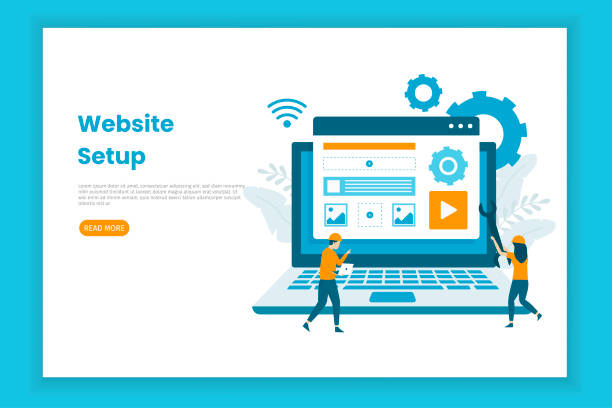
After establishing the basic principles of professional website design and ensuring its proper functioning, one can move on to the most specialized and advanced tips for business growth.
One such tip is the implementation of Personalization.
By using user data, you can display specific content, products, or offers to them, which greatly improves the user experience and increases conversion rates.
For example, if a user has previously viewed specific products, you can suggest similar products to them.
Marketing Automation is another advanced aspect that allows your website to automatically perform repetitive tasks such as sending welcome emails or following up on abandoned carts.
This helps maintain communication with customers and increase sales.
Integration with Customer Relationship Management (CRM) systems and email marketing automation tools can turn your advanced website building into a powerful hub for customer management.
The thought-provoking content at this stage is: Is your website smart enough to anticipate user needs? Can your website act as an independent sales and marketing tool? Furthermore, using emerging technologies like artificial intelligence for chatbots and virtual assistants can improve customer responsiveness and enhance user experience.
For professional website design that truly transforms a business, one must look beyond just a website, viewing it as an integrated growth platform that aligns with your marketing and sales strategies.
Conclusion and the Future of Website Design
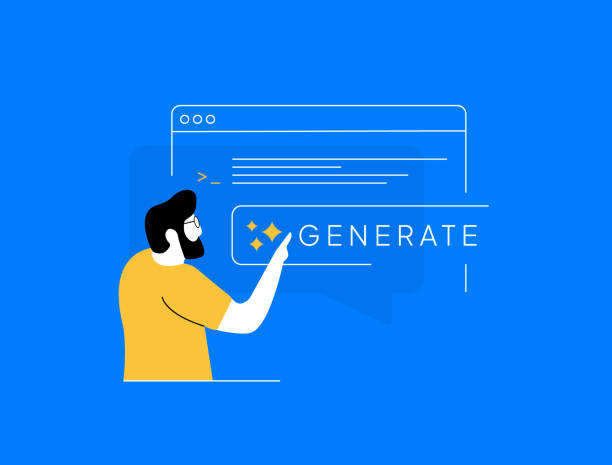
In conclusion, professional website design is a continuous journey, not a final destination.
As discussed in this analytical article, a successful website is not limited to visual beauty but requires meticulous planning, attention to user experience, search engine optimization, quality content production, and continuous maintenance and security.
Each of these steps plays a vital role in creating a powerful and impactful online presence.
The future of website design is also rapidly evolving, with new trends such as AI-driven design, Virtual Reality (VR) and Augmented Reality (AR) on the web, and No-code/Low-code platforms emerging.
Developers and business owners must constantly seek to learn and adapt to these changes to stay ahead in the competitive online space.
Professional website design is no longer just for large corporations; it is essential for every small business seeking to grow and be seen in the global market.
A good website can be a bridge between your business and your potential customers worldwide.
Therefore, investing in professional website design is not just an expense, but an investment in the future and sustainable success of your business in the digital age.
With a comprehensive and forward-thinking approach, your website can become a powerful tool for achieving your business goals and providing an entertaining and useful experience for users.
Frequently Asked Questions
| Row | Question | Answer |
|---|---|---|
| 1 | What is professional website design? | The process of building a user-friendly, visually appealing, fast, secure, and search engine-optimized website that achieves business goals and connects with the audience. |
| 2 | Why is responsiveness important in professional design? | Responsiveness ensures the website displays correctly on all devices (mobile, tablet, desktop) and provides a consistent user experience, which is also vital for SEO. |
| 3 | What is the role of UI/UX in professional website design? | UI (User Interface) focuses on the visual aesthetics and appearance of the website, and UX (User Experience) focuses on ease of use, simple navigation, and enjoyable user interaction with the website. Both are essential for attracting and retaining the audience. |
| 4 | How does website loading speed affect its professionalism? | High loading speed improves user experience, reduces bounce rate, and is an important factor in website ranking by search engines. |
| 5 | What is the importance of SEO in professional website design? | SEO helps the website appear in Google search results and other engines, attracts more organic traffic, and contributes to business growth. |
| 6 | What role does quality content play in a professional website? | Engaging, relevant, and practical content keeps users on the website longer, increases brand credibility, and is very important for SEO. |
| 7 | What does professional website security include? | Using an SSL certificate, regular updates of the platform and plugins, regular backups, using strong passwords, and protection against cyberattacks. |
| 8 | What platforms are common for professional website design? | Content Management Systems (CMS) like WordPress and Joomla, as well as coding frameworks like React, Angular, and Vue.js for custom development. |
| 9 | What are the main phases of professional website design? | Planning and research, UI/UX design, coding and development, testing and launch, and finally maintenance and support. |
| 10 | What is the main difference between a professional website and an amateur website? | A professional website is built with a focus on business goals, user experience, security, performance, and optimization, while an amateur website usually lacks these comprehensive and targeted approaches. |
And other services of RasaWeb Advertising Agency in the field of advertising
Smart Marketplace: A creative platform to improve customer acquisition through intelligent data analysis.
Smart Sales Automation: A professional solution for digital branding focusing on intelligent data analysis.
Smart Digital Advertising: A creative platform to improve click-through rate increase through intelligent data analysis.
Smart Google Ads: A fast and efficient solution to increase click-through rate by focusing on using real data.
Smart Data Analysis: A creative platform to improve campaign management using real data.
And over hundreds of other services in the field of internet advertising, advertising consultation, and organizational solutions.
Internet Advertising | Advertising Strategy | Advertorials
Resources
10 Secrets of Professional Website Design
SEO Principles for Website Success
The Importance of User Experience in Web Design
Essential Tools for Web Designers
? For a big leap in your business and reaching the pinnacle of success, RasaWeb Afarin Digital Marketing Agency is by your side with its specialized services. Get a powerful online presence right now with fast and professional website design.
📍 Tehran, Mirdamad Street, next to Bank Markazi, Kazerun Jonubi Alley, Ramin Alley, No. 6

